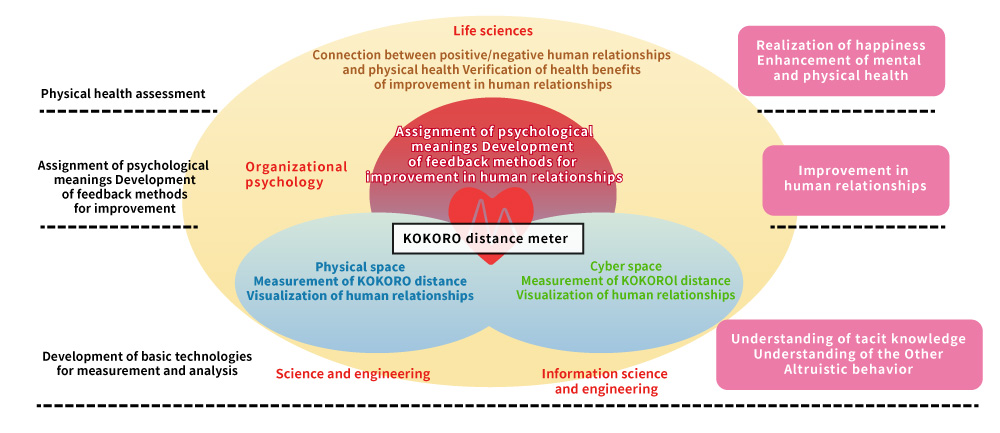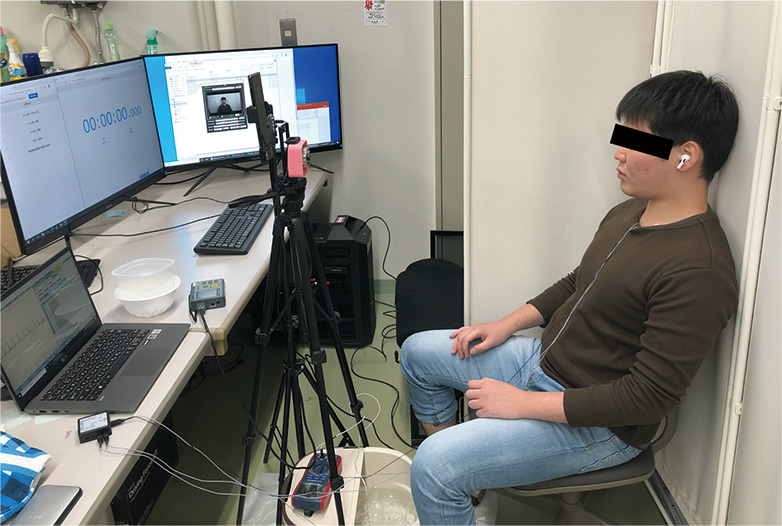Research AreaⅣ Promoting the health and pursuit of Ikigai (a reason for living) for the elderlyHuman relationship-building technology based on “KOKORO* Distance Meter” in Physical and Cyber Spaces
*Kokoro”心” is Japanese word which includes the meaning of individual mind, mental, emotion, characteristic or psychological state for human.
Improving the quality of human relationships with a “KOKORO Distance Meter,” enhancing people’s mental and physical health and happiness
Leaders
-
Project leaderShima OkadaProfessor, Department of Robotics, College of Science and EngineeringProfile
-
Group leaderYoko NishiharaProfessor, Department of Information Science and Engineering, College of Information Science and EngineeringProfile
-
-
Group leaderEri MukaiProfessor, Department of Biomedical Sciences, College of Life SciencesProfile
R-GIRO dedicated researcher
Measuring KOKORO distance in physical and cyber spaces and establishing human relationship-optimizing technologies
As people live increasingly longer today, with 100-year life expectancy becoming less exceptional, an active debate is taking place on the importance of intangible assets, which are getting harder than ever to express in monetary value. Among those intangible assets, physical and mental health and good relationships with family and friends are considered particularly important, which are called “vitality assets.” Reports indicate that the quality of human relationships among individuals and in organizations affects people’s physical health as well as mental health.
However, human relationships and related mental condition have always been considered too complex to understand objectively. Under the circumstances mentioned above, as today’s society is transitioning to Society 5.0 (super smart society), human relationships are now being formed in an ever-expanding sphere encompassing physical and cyber spaces, including the Internet, as well as physical-cyber fused spaces such as web conferences and video chats. People are thus undergoing an unprecedentedly dynamic and speedy change in their environment and communication styles, which makes it necessary to urgently develop and generalize the use of technologies that optimize human relationships while taking into account the surrounding situation.
As we mentioned above, , we intend to develop technologies contributory to the formation of human relationships in both physical and cyber spaces with a focus on mental health in this research project. In concrete terms, we begin by developing a technology that objectively assesses KOKORO distance as a degree of psychological closeness that a person feels vis-à-vis his or her interlocutor in various communication settings. We will then identify the risk factors that reduce this degree of closeness and construct a system that predicts improvement in the state of human relationships as a human relationship-optimizing technology.
It is said that the quality of human relationship is the most important factor influencing happiness and health. We hope this research project helps people improve the quality of their relationships, and eventually enhance their mental and physical health and happiness.
-

Research results envisaged in the project
Measuring KOKORO distance and mental and physical health, analyzing how they are related, and assigning psychological meaning
This research project is conducted by four groups that collaborate with one another. Firstly, the Okada Group is in charge of objectively measuring KOKORO distance and the quality of human relationships, and visualizing the measured results. For measurement in physical (real-life) spaces, the group will develop a wearable multi-sensor system that measures biological data such as electrocardiograms, respiratory rate, perspiration, active mass, and vasoconstrictor response. For measurement in physical-cyber fused spaces such as web conferences, the group will develop an image-processing technology that uses a non-contact sensing method by applying autonomic nerve evaluation based on the analysis of camera-captured images of people’s faces. The group will also construct a model of states of human relationships using a range of biological information, with cooperation from the Nishihara Group, which works on the visualization of human relationships in cyber spaces. With this model used as a “KOKORO distance meter,” risk factors that deteriorate the quality of human relationships will be identified in an attempt to develop a system that predicts their improvement.
The Prof.Nishihara’s Group is charged with the measurement of KOKORO distance in one-on-one interpersonal relationships in cyber spaces. Prof. Nishihara has already succeeded in inferring participants’ intentions in verbal communication and the degrees of friendliness based on the endings of Japanese utterances such as “…desu” and “…dayo” observable in chat tool conversation. Using this knowledge and the features of communication media, such as written text, voices, and video images used in cyber spaces, the group will propose a method to measure KOKORO distance. At the next stage, this method will be developed to be applicable to the measurement of KOKORO distance in one-on-many communication, in an attempt to visualize human relationships in cyber spaces.
The Prof.Yamaura’s Group will process the data on KOKORO distance and human relationships in physical and cyber spaces captured by the Okada and Nishihara Groups, assigning meanings to them from a psychological perspective. The group will participate in measurement sessions by the Okada and Nishihara Groups and conduct questionnaire surveys consisting of various psychological indicators. The data thus obtained will be collated with data from the quantitative evaluation and measurement developed by the other two groups and data on physical health obtained by the Mukai Group so that all data sets can be assigned psychological and subjective meanings and are interpretable. In addition, the YamauraGroup will develop an effective feedback method for the results of KOKORO distance measurements for individuals and groups. The visualization of KOKORO distance through measurement would be useless unless it could be applicable to the improvement of human relationships for the persons concerned. Therefore, interviews and surveys on feedback will be conducted with participants in experiments by the Okada and Nishihara Groups to determine feedback details that are useful and effective for participants , considering the types of information to be provided and the timing, frequency, and format of their provision, based on the indicators of the KOKORO distance meter. This will be followed by verification.
The Mukai Group is studying how physical health is related to the quality of human relationships and change in the state of mind. For this purpose, the group will clarify how physical health is related to the objective and quantitative data measured by the Okada and Nishihara Groups on human relationships and mental states in physical, cyber, and physical-cyber fused spaces. Firstly, change in physical health will be monitored comprehensively and exhaustively, by conducting nutritional surveys appropriately because mental stress tends to cause overeating or overnutrition ,in addition to factors related to lifestyle-related diseases, such as respiratory rate, heart rate, electrocardiogram data, blood pressure, and blood sugar levels. The group will then attempt to elucidate how the monitored results are related to measured data on human relationships and mental states, thus developing health indicators using biomarkers. After improvement is confirmed in human relationships attributable to the feedback method developed by the Yamaura Group, a demonstrative study will be conducted to verify its effectiveness in improving physical health. This should eventually lead to realizing and promoting a system that improves the quality of human relationships.
Further research for the next generation, for which KOKORO distance-measuring indicators will be indispensable
In this project, we envision active participation by young researchers, especially female researchers. By supporting the career paths of female researchers active in various fields and announcing widely their research involvements and achievements, we hope to contribute to developing social trends wherein the younger generation from elementary school students to graduate students can aspire to be a researcher regardless of gender.
In 2020, the spread of COVID-19 completely transformed many people’s lifestyles. One particularly significant change has been the considerable increase in the time and occasions for cyber-space communication. Due to this change and many other factors, it is believed that the need will continue to grow for objective indicators that measure and determine optimal interpersonal physical and KOKORO distance. We are pursuing this research project in the belief that its results will be indispensable for the next generation under such circumstances.

A cold water test
077-561-3488 (9:00-17:30 on weekdays)
072-665-2570 (9:00-17:30 on weekdays)
075-465-8224 (9:00-17:30 on weekdays)
